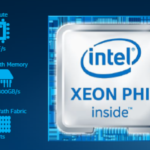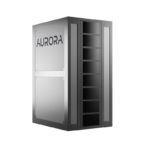On today’s processors, it is crucial to both vectorize (using AVX* or SIMD* instructions) and parallelize software to realize the full performance potential of the processor. By optimizing their MHD astrophysics applications with tools from Intel Parallel Studio XE, and running on the latest Intel hardware, the NSU team achieved a performance speed-up of 3X, cutting the standard time for calculating one problem from one week to just two days.
3X Performance Boost Using Intel Advisor and Intel Trace Analyzer in Astrophysics Simulations
18 Petaflop Stampede2 Supercomputer Dedicated at TACC
Stampede2 is the newest strategic supercomputing resource for the nation’s research and education community, enabling scientists and engineers across the U.S., from multiple disciplines, to answer questions at the forefront of science and engineering. “Building on the success of the initial Stampede system, the Stampede team has partnered with other institutions as well as industry to bring the latest in forward-looking computing technologies combined with deep computational and data science expertise to take on some of the most challenging science and engineering frontiers,” said Irene Qualters, director of NSF’s Office of Advanced Cyberinfrastructure.
Podcast: A Retrospective on Great Science and the Stampede Supercomputer
TACC will soon deploy Phase 2 of the Stampede II supercomputer. In this podcast, they celebrate by looking back on some of the great science computed on the original Stampede machine. “In 2017, the Stampede supercomputer, funded by the NSF, completed its five-year mission to provide world-class computational resources and support staff to more than 11,000 U.S. users on over 3,000 projects in the open science community. But what made it special? Stampede was like a bridge that moved thousands of researchers off of soon-to-be decommissioned supercomputers, while at the same time building a framework that anticipated the eminent trends that came to dominate advanced computing.”
Fujitsu Powers KNL Remote Access Program with Intel HPC Orchestrator
In this video from ISC 2017, Tom Krueger from Intel and John Wagner from Fujitsu describe the new KNL Remote Access Program. Now, with the power of Intel HPC Orchestrator, Fujitsu customers can gain access to a small cluster of Intel Xeon Phi processors to test and tune their codes. The freely available cluster environment enables users to participate in activities such as benchmarking, code development, as well as code optimization and validation either using the pre-installed applications or those brought by the user.”
RSC Group from Russia Brings Hot Water Cooling to HPC
Last week at ISC 2017, the Russian RSC Group showcased its ultra high-dense scalable and energy efficient RSC Tornado cluster solution as well as a full set of components for modernizing HPC systems to become 100% hot liquid cooling. “The RSC Tornado is based on 72-core Intel Xeon PhiTM 7290 processor has established the world computing density record for x86 architecture in 1.41 Petaflops per cabinet or over 490 Teraflops/m3.”
Intel Processors for Machine Learning
Machine Learning is a hot topic for many industries and is showing tremendous promise to change how we use systems. From design and manufacturing to searching for cures for diseases, machine learning can be a great disrupter, when implemented to take advantage of the latest processors.
PSSC Labs Updates CBeST Cluster Management Software
Today PSSC Labs announced it has refreshed its CBeST (Complete Beowulf Software Toolkit) cluster management package. CBeST is already a proven platform deployed on over 2200 PowerWulf Clusters to date and with this refresh PSSC Labs is adding a host of new features and upgrades to ensure users have everything needed to manage, monitor, maintain and upgrade their HPC cluster. “PSSC Labs is unique in that we manufacture all of our own hardware and develop our own cluster management toolkits in house. While other companies simply cobble together third party hardware and software, PSSC Labs custom builds every HPC cluster to achieve performance and reliability boosts of up to 15%,” said Alex Lesser, Vice President of PSSC Labs.
Rescale Announces ScaleX Labs with Intel Xeon Phi and Omni-Path
Today the Rescale HPC Cloud introduced the ScaleX Labs with Intel Xeon Phi processors and Intel Omni-Path Fabric managed by R Systems. The collaboration brings lightning-fast, next-generation computation to Rescale’s cloud platform for big compute, ScaleX Pro. “We are proud to provide a remote access platform for Intel’s latest processors and interconnect, and appreciate the committed cooperation of our partners at R Systems,” said Rescale CEO Joris Poort. “Our customers care about both performance and convenience, and the ScaleX Labs with Intel Xeon Phi processors brings them both in a single cloud HPC solution at a price point that works for everyone.”
Intel Xeon Phi Processor Intel AVX-512 Programming in a Nutshell
In this special guest feature, James Reinders discusses the use of the Intel® Advanced Vector Instructions (Intel® AVX-512), covering a variety of vectorization techniques available for accessing the performance of Intel AVX-512.
Eurotech Unveils Aurora Tigon V4 System with Intel Xeon Phi
Today Eurotech announced the Eurotech Aurora Tigon v4, the flagship product of the Eurotech hybrid HPC systems line that adds support for the second generation Intel Xeon Phi Processor. With up to 72 cores (288 threads) per CPU the Xeon Phi brings new levels of performance in the datacenter: the Tigon is one of the most powerful and power efficient supercomputers on the market, featuring up to 18.432 CPU cores and 256 Nvidia Kepler GPUs at less than 100KW per rack.












